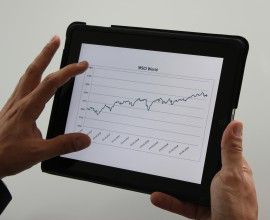
Weekly Newsletter
Money makes the world go round. And monetary policy has been driving markets for a while. Central banks around the world have been flooding markets with money since the financial crisis. Currently ECB and US Fed are dominating the headlines. At first glance they appear to pursue contrary approaches. The ECB is just increasing its stimulus program while the US Fed is widely expected to increase interest rates at the next meeting (Dec. 15-16). This would be the first adjustment since December 2008 and the first increase since 2006.
To get the big picture it is worth to take a look at the 10year chart of both central bankÕs balance sheets – see our chart of the day. Since both banks have driven their key interest rates to zero for a while their bonds buying programs have become the preferred instrument which results in inflated balance sheets. During financial crisis buying bank and government bonds has been justified as extraordinary measure. Although central banks are not meant to finance governments they do so around the world. So the US Fed has more than doubled their balance sheet after financial crisis 2008/09. Most economists predict negative side effects such as rapid inflation. So far we have no inflation of wages, consumer prices or producer prices yet – despite low unemployment in leading countries such as the US or Germany which is very welcome. We do see some asset inflation, we do see many investors forced to take risk since they cannot find safe yields.
So where do we go from here? By now most governments are happy since negative side effects have been moderate so far. The ECB is pushing the pedal and might be forced to continue so if they do not want to be broken apart by its weakest members. The US Fed has been lifting the pedal for about a year after being the pacemaker for many years – see balance sheet chart. So its no turnaround yet and not even a slowing down yet. A rate increase might make sense for two reasons. First, it supports credibility after announcing it would happen this year. Second, it looks like getting back to normal which according to Yellen should be a source of proud. So yes, we agree for the first time that there might be a small step, however Erwin Lasshofer and his INNOVATIS team see no turnaround.
Archives
- June 2019 (1)
- March 2019 (1)
- February 2019 (1)
- December 2018 (1)
- May 2018 (1)
- January 2018 (1)
- December 2017 (2)
- October 2017 (1)
- September 2017 (1)
- August 2017 (1)
- July 2017 (1)
- June 2017 (2)
- May 2017 (2)
- April 2017 (2)
- March 2017 (3)
- February 2017 (2)
- January 2017 (2)
- December 2016 (4)
- November 2016 (3)
- October 2016 (3)
- September 2016 (2)
- August 2016 (5)
- July 2016 (2)
- June 2016 (4)
- May 2016 (1)
- April 2016 (4)
- March 2016 (5)
- February 2016 (3)
- January 2016 (3)
- December 2015 (5)
- November 2015 (5)
- October 2015 (4)
- September 2015 (3)
- August 2015 (7)
- July 2015 (7)
- June 2015 (5)
- May 2015 (6)
- April 2015 (9)
- March 2015 (9)
- February 2015 (9)
- January 2015 (9)
- December 2014 (11)
- November 2014 (10)
- October 2014 (3)
- September 2014 (1)
- August 2014 (2)
- July 2014 (2)
 Investor Login
Investor Login






